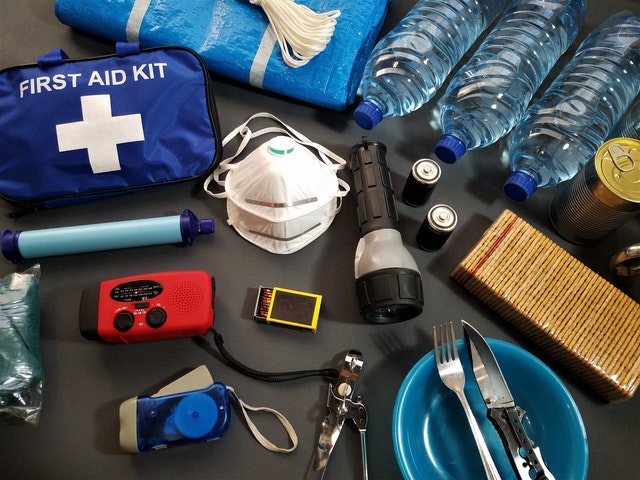While we may not like to think about emergencies, it is never a bad idea to plan for the worst and hope for the best. You never know when an emergency might come, perhaps a blackout, or a storm, that might leave you stuck inside your house for a while, leaving you without access to shops and pharmacies. Planning for a rainy day, for an emergency, can keep you and your family safe, but how do you go about it?
 While you can’t prepare for every scenario, and you also can’t have every item available at your disposal in an emergency, there are certain items that you can keep at home to be used in cases of emergencies. Here is a good list to follow when planning out an emergency kit and what items to keep within it.
While you can’t prepare for every scenario, and you also can’t have every item available at your disposal in an emergency, there are certain items that you can keep at home to be used in cases of emergencies. Here is a good list to follow when planning out an emergency kit and what items to keep within it.
Medication and First Aid
While a first aid kit is a must and often thought of, medication can sometimes fall through the cracks and be forgotten about during preparations. Especially if you require a lifesaving medication such as insulin, asthma inhalers, or high blood pressure meds, you must have an emergency puppy available to you should something happen and leave you stuck at home and unable to leave, or unable to access your local pharmacy. While we are used to being able to pick up medication or refills very easily, in an emergency it may not be so easy. Ensuring that you have a good emergency supply of your medication readily available can be life-saving. Having an extra inhaler or a month’s extra supply of your pills stored away in your home can make all the difference when faced with a natural disaster or possible emergency lockdown in your city.
No-Perishable Food Items
Having a special stock of non-perishable food items can serve you well in an emergency. The best option to get is specially designed Survival Food Kits that have been designed for such situations. If you don’t have any of these though, then dried and canned items that have a long shelf life can be used if you can’t make it to the store, and these are useful as they require minimal preparation and energy. Soups, and vegetables in cans that offer a situation, and are filling, but take little energy to heat are a great idea to have. Bars such as granola or energy bars that pack a large punch but don’t take up too much space are also a good idea to have stored for emergencies. When planning and packing for emergencies, it is a good idea to have at least 3 days worth of food ready and available for each member of your family.
Water
Having a supply of potable water is just as important as food, if not more. Water is the number one resource you will need if you are trapped in your home, or if there is a supply issue with your indoor plumbing. Making sure that you have water readily available for at least 3 days will keep you and your family going in the case of an emergency. The importance of water cannot be overlooked, so make sure this necessary supply is not missing from your preparations.
Propane and Gas Stove/Heat Source
If you live in an area that suffers from winter storms, you may want to consider buying a camping stove and/or heat source in the case of a power outage. If you have left in sub-zero temperatures with no way to warm yourself, it could spell disaster for you and your family while you wait for power to be restored. Having a few additional propane tanks available to keep the heat going for longer than a couple of hours will allow you to ensure your family’s safety in the case of an emergency. Having a camp stove also allows you to prepare food, while also providing a source of heat. While it won’t heat your whole home, it will allow you and your family to hold up in one room and stay comfortable when facing an emergency in sub-zero temperatures.
While you can’t plan out an emergency, you can at least make sure that you have emergency supplies available to you. In the event of power outages and storms, you may need to stay in your home until help arrives. Making sure that you can do so safely and comfortably by storing all you would need for an emergency can mean the difference between life and death for you and your family.
Planning is not inviting disaster, but rather protecting your family from all possible emergencies. It is better to have emergency supplies available and not ever use them than it is to not prepare and be left with nothing in an emergency.
Related Posts: